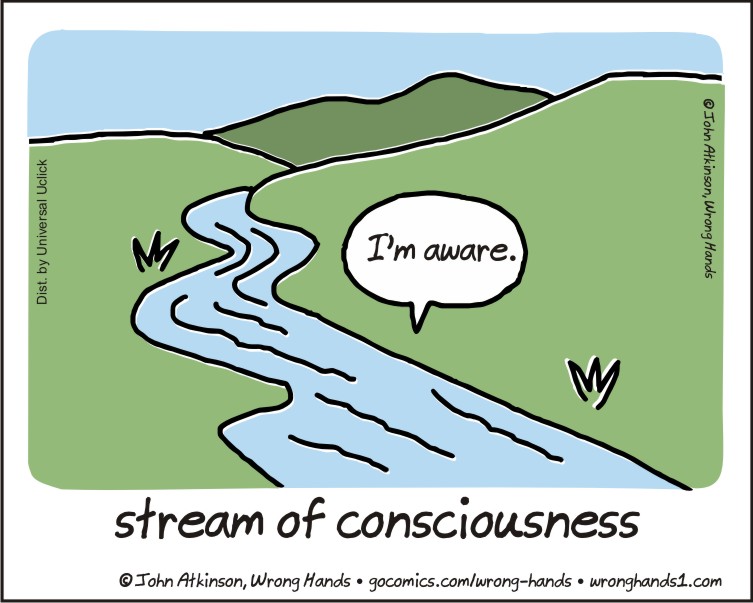
In the last two posts, with the help of the imaginative and erudite folks at Existential Comics, we've discussed how Hume and the Buddha agreed that there is no self in the traditional sense, no enduring person behind the experience day to day, no soul subject to judgement as good or evil.
We also discussed the extent to which their inferences from that premise diverged (utterly).
Today I'll ask a Jamesian question about what underlies those last two posts.
What is it to say of any X that it exists? What is it to deny existence of any X?
What is it to say that the millionth digit of the number pi exists? Does that imply that we know what it is? No. For all I know (I haven't looked into the matter) no one has yet bothered to calculate what the millionth digit of pi is. If they HAVE, then we could use some further digit for the example.
Does our affirmation of its existence mean anything Platonic -- that it exists beyond the cave of our earthly affairs, in a super-sensory realm? I don't believe anything like that is implied.
When we say that the millionth digit of pi exists we say only that if certain operations are followed, a certain result will eventuate. If we or a computer acting on our behalf did pursue the calculation long enough then it would become clear that the millionth digit must be ... 7. Or something other than 7. Whichever.
What I conclude from this thought experiment is that an operational/pragmatic understanding of X does not suggest that X doesn't exist, it only offers clarity as to what "X" means.
I'm not sure that the bundle theory of the self need be a denial of the existence of the self in any sense.
I am sure that the related though distinct stream-of-consciousness theory of the self need NOT be a denial of the existence of the self in any very useful way.
So we can say of the imagined argument in that imagined diner that it would founded on a confused premise, and the misfortune of an agreement in confusion between the parties.
Christopher, in the first paragraph, you appear to use "self" or "soul" interchangeably, which I believe is inappropriate. A "soul" is a purported entity that can exist independently of and outlive the body, and belief in it depends solely (no pun intended) on faith. The "self" is a name we give to certain connections between neurons in the brain, if they occur, which is something that, in theory, scientists could investigate. Hume denied the existence of both the soul and the self, but it is his denial solely of the self that your three posts have addressed. In your discussion of the Buddhist belief in reincarnation in the first of your three posts, you correctly refer to the soul, as the self as I've defined it cannot be reincarnated. However, you also write, "what IS it that gets reincarnated, if it is not the self or soul?," and that question suggests that Buddhists may not draw the distinction that I do between the soul and the self; I don't know whether they do.
ReplyDeleteHenry,
DeleteIn between my reference to a "self" and a "soul" in the above paragraph, there lies a quick definition of what I mean by BOTH terms, although of course I acknowledge differences in connotation. Both terms refer to the "enduring person behind the experience day to day." The question is whether there is some non-illusory sense in which this entity called Henry Cohen is the same being today as the creature of the same name of yesterday, or a year ago, or a decade ago. If and to the extent that we say the answer is "yes," then we know what there is for neurologists to investigate.
The question of whether the soul or self survives death and can inhabit another body for another round of life and death (or can experience a cloud-composed paradise behind pearly gates) is, from one point of view, a matter of degree. One we agree that there is something that is in YOU that has survived the changes in your life of the last decade, the question arises of just how enduring that whatever-it-is will turn out to be.
Of course if we take it that a self exists then we can examine that fact in neurological terms, but I would say those are questions about how it exists, how it maintains itself inside your skull, etc., not questions of what we mean by it.
So far as I know I'm in accord with the Buddha in using the terms this way, though the depth of my scholarship as to Buddhism would not survive examination.
I am beyond doubt the same creature I was yesterday, or a year ago, or a decade ago, because I have memories of my actions and thoughts from those previous times. I do not say that I have a memory of "myself," because that would beg the question by assuming that I have a "self" that consists of more than my memories. It is theoretically possible that I have a "self" that consists of more than my memories; my "self" might be a feature of my brain that I was born with. But to believe in the existence of a self or a soul beyond that--one that could survive my death--would not be merely a matter of degree. It would require a leap of faith and would not be subject to scientific investigation.
Delete